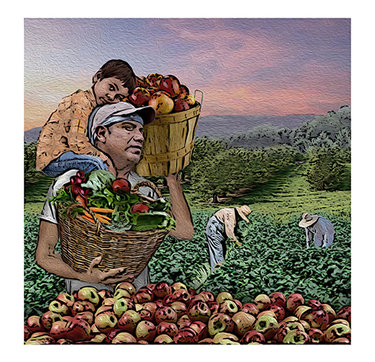Labor Day is no picnic for farm workers who’ve been left behind
At the end of the 19th Century, the United States was in a time of great upheaval — termed the Industrial Revolution.
The rural communities that had been the backbone of America since it was first settled by Europeans changed radically as people left for the cities and factory jobs. At the same time, immigrants came to the United States, many seeking a better life.
The average American worked every day for 12 hours, even on weekends. Young children worked alongside their parents in factories, mines, and mills.
Many people toiled in unsafe conditions, with no fresh air, no regular breaks, no clean workplaces.
Labor unions, which had first formed in the United States in the late 1700s became central, organizing rallies and strikes, forcing employers to improve conditions, to reduce hours, and to increase pay.
In 1894, as Pullman workers struck to protest wage cuts, Eugene Debs led the American Railroad Union in a boycott of all Pullman railway cars, crippling what was then the nation’s major means of transport.
The federal government sent troops to Chicago to break the strike, causing rippling waves of riots and the death of more than a dozen workers.
Shortly after, Congress made Labor Day a holiday.
One-hundred-and-twenty-eight years later, when Labor Day has become a time for end-of-summer barbecues and back-to-school sales, we would be wise to reflect on the history of this day.
A renewed interest in labor rights and unions is afoot in these United States and one of the current issues hits close to home.
On Sept. 6, the day after Labor Day, the Farm Laborers Wage Board will meet to recommend to the state’s labor commissioner, Roberta Reardon, the overtime threshold for farmworkers.
As Amercians left their farms for factories in the 19th Century and, after decades of gains for workers — with the five-day work week cemented in the Great Depression to assuage underemployment — farmworkers were left behind.
The federal Fair Labor Standards Act, first passed in 1938 and last amended in 2007, states, “The Congress finds that the existence, in industries engaged in commerce or in the production of goods for commerce, of labor conditions detrimental to the maintenance of the minimum standard of living necessary for health, efficiency, and general well-being of workers” burdens commerce and the free flow of goods, constitutes unfair competition, leads to labor disputes obstructing the free flow of goods, and interferes with the orderly and fair marketing of goods.
What goods could be more central to our nation’s well being than food?
And yet, there are many exemptions for agricultural workers that allow employers to pay them less than the federal minimum wage and all farmworkers are exempt from the overtime pay provision of the Fair Labor Standards Act. This means that agricultural workers do not have to be paid more than their regular rate when they’re asked to work over 40 hours per week.
Individual states, however, can require a higher minimum wage for farmworkers and a higher rate of pay for overtime work. New York is among a handful of states — others are California, Colorado, Hawaii, Maryland, Minnesota, and Washington — that have required overtime pay for farmworkers.
After a years-long battle, New York in 2019 adopted the Farm Laborers Fair Labor Practices Act so that the state’s farmworkers for the first time were by law eligible to join a union, take off one day a week, and earn overtime at one-and-a-half times their regular rate of pay for any hours worked over 60 in a week.
In January, the Farm Laborers Wage Board, set up by the 2019 act, resolved that the 60-hour threshold should, over the course of a decade — with a four-hour reduction every two years — be reduced to a threshold of 40 hours.
California used a similar plan, gradually lowering its threshold so that, as of Jan. 1 of this year, California requires that any agricultural employee working more than eight hours a day or more than 40 hours a week receive overtime compensation.
“Data on agricultural employment and wages in California suggest that overtime pay for farmworkers has not corresponded with any negative impacts or shocks to the California farm economy or labor market,” said the Economic Policy Institute in testimony it submitted to New York’s Farm Laborers Wage Board.
The issue played out locally when Republican politicians — including the congressman running for governor, Lee Zeldin, and the third in the GOP power structure nationwide, Elise Stefanik — held a press event this month at a New Scotland farm covered in our front-page story by Sean Mulkerrin.
The assemblyman who hosted the event, Christopher Tague, had voted in favor of a tax credit to be given to farmers who pay their workers for overtime.
Yet at the same time, he said at the rally, “How much more can we subsidize? How much more can we subsidize? And for how long? … [The] American people can’t afford to really pay what food’s worth.”
This is a false premise.
Would we, for example, say that grocery-store clerks can’t be paid overtime?
Or the truckers who bring the food from farm to market? Or the workers in the factories who make the equipment that the farmers use for planting and harvesting, for milking and branding?
Let’s look at the numbers. There are 440 farms in Albany County with 94 percent of them family farms — and we respect those families and the hard work they do. Just 26 percent hire farm labor.
Those are similar to statewide numbers: Of the 33,438 farms in New York State, 96 percent are family farms, but just 27 percent hire farm labor.
Why should just one segment — a small one at that — be penalized while the rest of the workers employed in the vast network of food production and distribution get their fair share?
Stefanik said the Democrats are waging “a war on rural America.”
Farmworkers live in rural America just as the farmers do. Don’t those workers deserve fair wages?
Yes, the voices of local farmers were heard at the press event — they were duly filmed and reported. But what about the farmworkers?
We talked last week to New Scotland resident Timothy Albright who went to work picking apples at Indian Ladder Farms right after he graduated from Voorheesville’s high school in 1979, retiring in 2020.
“I retired at 59, but that was only because I was disabled,” he said.
Albright said of farm work, “It has a physical toll on your body that will leave it broken. You’re bending, you’re carrying heavy loads.” He added to the list of ailments farmworkers suffer from having to spray pesticides and be exposed to other dangerous chemicals.
“It’s hard labor that will leave you a broken person,” he said.
Albright noted that The Enterprise reported Peter Ten Eyck saying at the press event that he hadn’t had an American apply for a job at Indian Ladder Farms in three years.
“That’s because they don’t pay enough,” said Albright.
Indian Ladder hires Jamaicans for the harvest season. When Albright started working at the farm, he said they were called migrant workers, then they were called offshore labor, and they are now termed guest workers.
“In Jamaica, they’re lucky if they can make $25 a day,” Albright said. “So these guys, they come in on these crews. They’re stuck. They have no other options. And they’re not going to beef about it because, if they don’t get to come back, they have no other option in life to make the kind of money they can make here.
“They’re getting paid $15 and change an hour for doing jobs they should be getting well over $20 an hour for. I mean, they’re spraying pesticides and you’re taking on jobs that take a lot of thinking.”
Albright himself was paid extra for overtime work at Indian Ladder Farms. “I used to say to my boss, ‘I won’t work here if I don’t get paid overtime over 40 hours. I would go looking for another job … When I work more than 40 hours, you are buying my free time. You are buying that portion of my life that I should have for myself. So you should have to pay extra for it.’”
He added, “Now, the Jamaicans are in a little bit different situation because they don’t want any free time because they’re here away from their families. So they don’t want to be sitting idle in the camp.”
Albright went on, “I’m tired of hearing these farmers — and I know most of them — whine … They do well for themselves and they’re whining because they want to take the person at the bottom of the barrel who makes the least amount of money and keep them there. And it’s terrible. It’s wicked.
“It’s wicked to try to take the people at the bottom of the food chain, the working-class people at the bottom of the food chain who are making the least amount of money and hold them there and say, ‘We can’t survive if you make more money.’”
Albright concluded by asking a telling question: “How many parents sending their kids to local schools wish they … would be farm laborers? They don’t. And the reason being is it pays too little and it’ll break you physically.”
To help rural America, we urge fair wages for farmworkers, and that includes overtime pay. So, yes, we urge the Farm Laborers Wage Board to recommend, as proposed in January, phasing in over the next decade a threshold of 40 hours per week, after which overtime pay is required.
Commissioner Reardon should then implement that plan.
Studies have shown ill effects, other than the list of ill effects specific to farmworkers explained by Albright, that anyone working over 40 hours a week suffers.
“Long working hours have been found to be associated with cardiovascular and immunologic reactions, reduced sleep duration, unhealthy lifestyle, and adverse health outcomes, such as cardiovascular disease, diabetes, subjective health complaints, fatigue, and depression ,” says one summary. “There is increasing evidence to suggest the importance of midlife risk factors for later dementia.”
So, yes, employers should have to pay more for their workers to endure those ill effects.
The harm may not be as obvious as the abhorrent working conditions that led to the strikes and rallies in the 19th Century but they can be just as real.
Let’s keep that in mind as we celebrate Labor Day and work for a healthier America — rural as well as urban and suburban.



